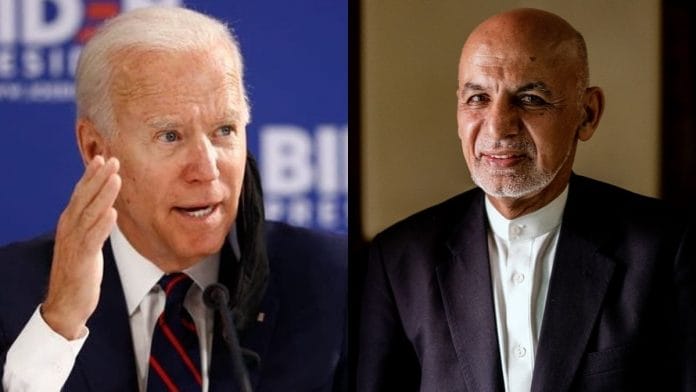New Delhi: The conviction of alleged terrorist Ariz Khan brings “closure” to the 2008 Batla House encounter, said ThePrint’s Editor-in-Chief Shekhar Gupta in episode 698 of ‘Cut the Clutter’ Monday. He also analysed key points in a leaked letter from US Secretary of State Antony Blinken to Afghanistan’s President Ashraf Ghani, outlining a four-point peace plan for the country.
Gupta began by explaining the Batla House encounter that took place on 17 September 2008. Members of the Delhi Police’s anti-terrorism squad, led by inspector Mohan Chand Sharma, raided a hideout, allegedly housing Indian Mujahideen terrorists in Delhi, Gupta said recalling the case. However, when two terrorists escaped and two police officers, including Sharma, were killed in the encounter, conspiracy theories mounted that the incident was organised by the police. This, despite the UPA government awarding Inspector Sharma the Ashoka Chakra after his death, based on the assessment that he died in the line of duty during a genuine encounter.
In light of the court ruling Monday that found Khan guilty of killing Inspector Sharma, Gupta remarked, “I strongly believe the calumny thrown at Inspector Mohan Chand Sharma, posthumously, has now been settled.”
Gupta went on to explain that Khan had escaped to Nepal following the encounter, after which he made contact with Indian Mujahideen operative Riyaz Bhatkal who suggested he go to Saudi Arabia and re-establish contact with remnants of the Indian Mujahideen.
“In 2017, he was apparently coming back to India via Nepal to relaunch Indian Mujahideen. It was at that point that he was arrested,” said Gupta. A month earlier, the police had arrested one of Khan’s accomplices who probably spoke about his whereabouts, he said.
‘No other instance of US asking India to formally join Afghan peace process’
The US intends to propose a UN-convened meeting of representatives of six countries, including India, to discuss a “unified approach to supporting peace in Afghanistan”, according to a letter from US Secretary of State Blinken to the Afghan President, accessed exclusively by private Afghan broadcaster TOLO News.
“We haven’t found another instance of America asking India, formally, to get involved in the Afghan peace process,” said Gupta.
The letter suggests the US wants to bring Turkey into the equation, which is curious considering US President Joe Biden still hasn’t made a call to Turkey’s President Recep Tayyip Erdoğan and had advocated supporting the Turkish opposition during his presidential campaign last year, added Gupta.
Giving India a seat at the table makes sense as it enjoys a traditional relationship with Afghanistan, shares the Wakhan corridor with the country and is a “powerful presence in the neighbourhood”.
The four-point peace plan, outlined by Blinken, also proposes that Afghan-American diplomat Zalmay Khalilzad continue to lead the peace talks, and that a meeting of top Taliban leaders and top Afghan government leaders be held in Turkey. A 90-day plan to prevent a spring offensive by the Taliban is also in the plan, explained Gupta.
The letter puts pressure on Ghani to settle on a plan and also implies that while the US remains committed to withdrawing its troops by 1 May, all options are on the table. “He [Blinken] is giving a hint to the Taliban that ‘don’t presume no matter what happens, we’ll cut our losses by May 1 and go away’. That was Trump’s line.”
‘Tricky’ policy options suggested by US to Afghan govt, Taliban
According to a New York Times report Sunday, it claims to have a copy of an outline of US policy options delivered by Khalilzad to Ghani’s government and Taliban negotiators on 28 February.
Citing the report, Gupta criticised some of the proposals. On the proposal to hold national elections once a transitional peace government has been established in Afghanistan, Gupta pointed out that “this is anathema to the Taliban who see elections as a kind of Western toxification”.
The proposal of a new Constitution that will guarantee rights for women, ethnic and religious minorities and setting up of a free press is also tricky since the Taliban seeks to bring everything under Islamic law, added Gupta.
He also spoke on the proposed 15-member High Council of Islamic jurisprudence consisting of seven Taliban leaders, seven Afghan government leaders and one appointed by the Afghan President. “Will the Taliban accept it because the other side will become seven plus one?” Gupta asked. A similar 15-member committee proposed for joint monitoring of the ceasefire mechanism may also face challenges.
However, “the most tricky of conditions” will be that the Taliban will have to remove all their personnel and all their military structures from neighbouring countries — “a euphemism for Pakistan”, said Gupta.
Gupta concluded by saying, “What the Biden administration has done is they’ve hit the ground running. They’ve ensured continuity in policy by keeping Zalmay Khalilzad there… They’ve thrown their weight behind the peace process. They’ve told the Taliban, we want to leave, but we are not going away in a hurry.”
Also read: US returns to South Asia pushing peace in Afghanistan, stability in India-Pakistan






